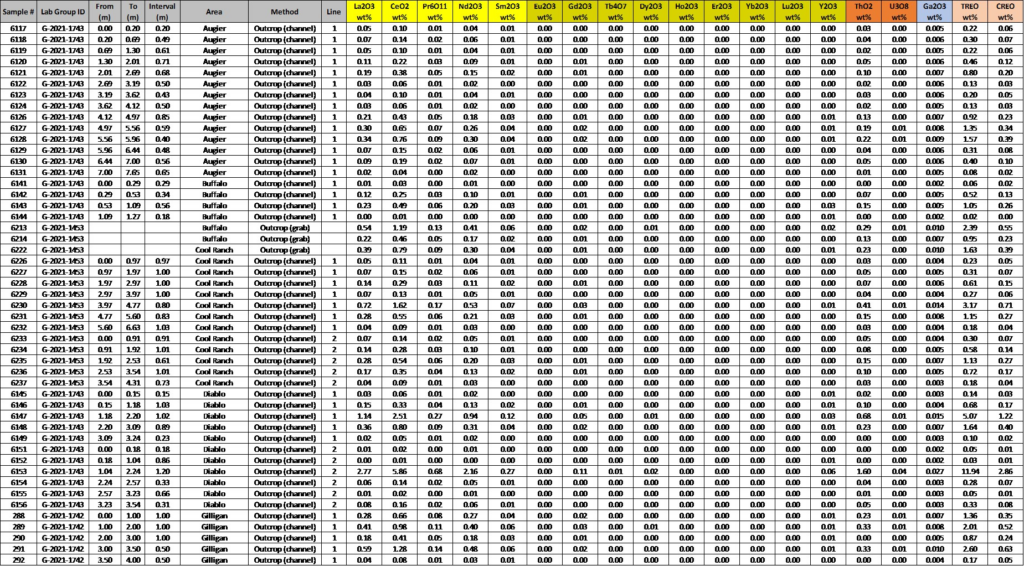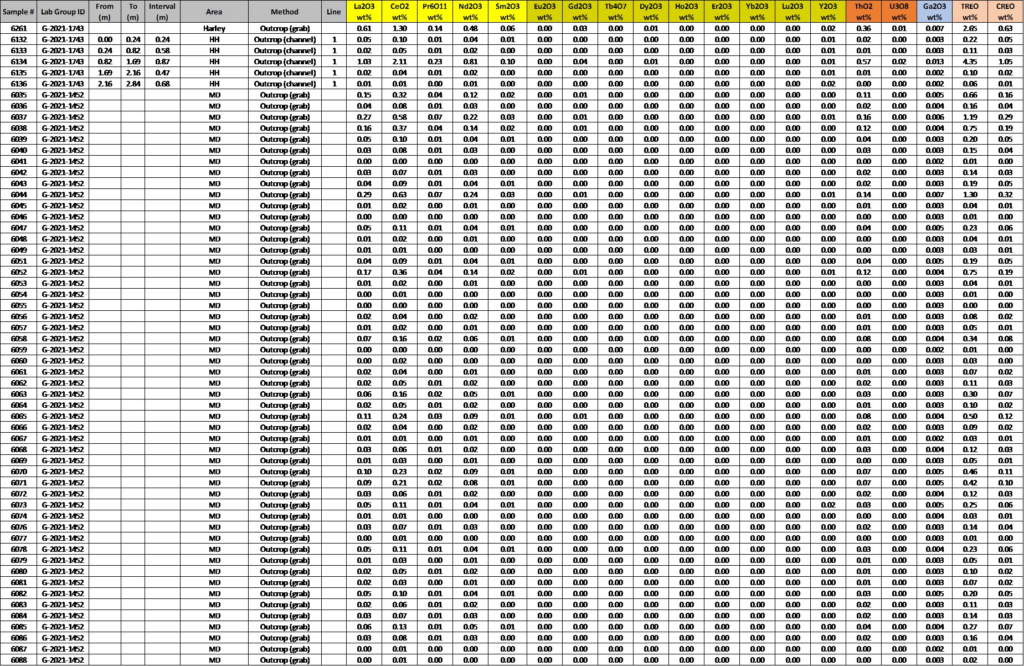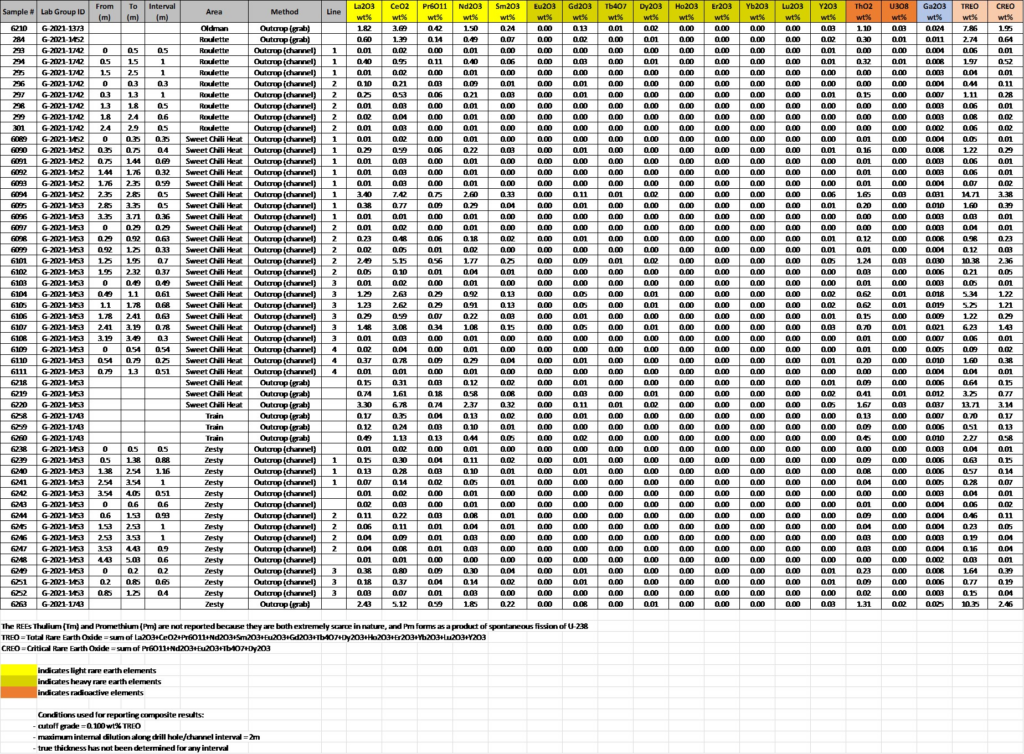Toronto, Ontario–(Newsfile Corp. – December 6, 2021) – Appia & Uranium Corp. (CSE: API) (OTCQB: APAAF) (FSE: A0I.F) (FSE: A0I.MU) (FSE: A0I.BE) (the “Company” or “Appia”) is pleased to announce new assays results from its 2021 field program at its 100%-owned Alces Lake high-grade rare earth elements (“REE“) and gallium property, Athabasca Basin area, northern Saskatchewan. Appia has received assays from grab samples and channel samples.
ALCES LAKE HIGH-GRADE REE PROJECT
Assay results from the Wilson North and Richards drill holes were announced on November 19, 2021 and confirmed some of the highest recorded rare earth grades discovered to date on the Alces Lake property. In addition, high-grade REE mineralization has now been identified throughout an area covering approximately 27 km2 of the Alces Lake block. Assay results have been returned from channel and grab samples and are reported in wt % TREO (total rare earth oxides) (see Tables 1 & 2). Highlights include:
- High grade REE mineralization has now been identified over an estimated 27 square kilometre area.
- Channel sample of 14.71 wt % TREO from Sweet Chili Heat and 11.94 wt % TREO from Diablo.
- 10.35 wt % TREO returned from grab sample at Zesty.
- 7.86 wt % TREO returned from grab sample along the Oldman River trend.
- New discovery of REE with 2.27 wt % TREO grab sample from “Train Domain”.
- Elevated Gallium values have been returned for all samples enriched in TREO.
Wilson-Richard-Charles-Bell (WRCB) Area
Alces Lake Field Assays
Appia conducted an extensive field geology and sampling program earlier in 2021, sampling previously untested occurrences of REE across the claims block. Multiple radiometric anomalies were identified with the full-property aerial geophysics conducted this year and confirmed as REE occurrences with field work. The association between REE and radioactivity is due to the thorium content of the REE host mineral, monazite. High-grade REE mineralization has now been identified throughout an area covering approximately 27 square kilometres. Elevated gallium (Ga2O3) values have also been identified throughout the area, as it is hosted within the same mineralogy as REE (monazite). Table 1 provides a summary of channel sample composites and Table 2 provides a summary of all channel sample results (95 samples total) and grab samples with results ≥0.1 wt % TREO.

Figure 1- Coverage of surface field assay results
Table 1 – Summary of channel sample composites.
| Including | |||||||
| Zone Name | Channel | Width (m) | TREO (wt %) | Ga2O3 (wt %) | Width (m) | TREO (wt %) | Ga2O3 (wt %) |
| Augier | 1 | 7.00 | 0.57 | 0.006 | 1.84 | 1.20 | 0.008 |
| Buffalo | 1 | 0.90 | 0.85 | 0.005 | 0.56 | 1.05 | 0.005 |
| Cool Ranch | 1 | 6.63 | 0.77 | 0.006 | 0.80 | 3.17 | 0.014 |
| Cool Ranch | 2 | 4.27 | 0.56 | 0.005 | 0.61 | 1.13 | 0.007 |
| Diablo | 1 | 3.32 | 2.22 | 0.008 | 1.02 | 5.07 | 0.015 |
| Diablo | 2 | 2.50 | 5.83 | 0.014 | 1.20 | 11.94 | 0.027 |
| Gilligan | 1 | 4.00 | 1.40 | 0.007 | |||
| HH | 1 | 2.16 | 1.83 | 0.007 | 0.87 | 4.35 | 0.013 |
| Roulette | 1 | 1.00 | 1.97 | 0.008 | |||
| Roulette | 2 | 1.30 | 0.96 | 0.006 | |||
| Sweet Chili Heat | 1 | 3.00 | 2.91 | 0.010 | 0.50 | 14.71 | 0.031 |
| Sweet Chili Heat | 2 | 2.03 | 3.94 | 0.014 | 0.70 | 10.38 | 0.030 |
| Sweet Chili Heat | 3 | 2.68 | 4.60 | 0.017 | |||
| Sweet Chili Heat | 4 | 0.25 | 1.60 | 0.010 | |||
| Zesty | 1 | 3.04 | 0.49 | 0.005 | |||
| Zesty | 2 | 3.83 | 0.26 | 0.003 | |||
| Zesty | 3 | 1.25 | 0.71 | 0.004 | 0.20 | 1.64 | 0.008 |
The Company’s channel sampling program consists of continuous samples, each of which did not exceed
1.2 m, taken along the exposed rock at surface.
Western Anomaly and Oldman River Area
The Western Anomaly area, first discovered during the 2021 field season, has returned high-grade REE mineralization from several zones, the most significant of which are within 800 m of each other. Similar to elsewhere on the property, REE are hosted in monazite within biotite-rich pegmatitic structures. Assay results have returned channel samples with 14.71 wt % TREO (Sweet Chili Heat) and 11.94 wt % TREO (Diablo) and a grab sample with 10.35 wt % TREO (Zesty).
Elevated REE mineralization from 52 grab samples with measurable wt % TREO over a strike length of approximately 200 m have been returned from the MD zone as shown in Table 2. This potentially bodes well for the potential of a more voluminous mineralized body.
A 7.86 wt % TREO grab sample has also been returned from the Oldman River trend. This result is the highest-grade to date from the area and reveals the potential for more enriched structures.
Nicolas Guest, Vice President of Exploration notes “We can now confirm the presence of high-grade REE mineralization in the newly discovered Western Anomaly area. Many of these zones are clustered within close proximity to one another, which could prove beneficial for extraction should future work determine they are economically viable. The Oldman River trend hosts some of our most continuous mineralization and we are excited for its higher-grade potential as a result of these latest assays.”

Figure 2 – Field assay results from the Western Anomaly and Oldman River areas.
WRCB Area – Train Domain Area
A grab sample from the Train Domain has returned 2.27 wt % TREO within sheared granitic gneiss. Until now, all REE mineralization on the Alces Lake property has been discovered in the Beaverlodge Domain. In 2021, Appia more than doubled the Company’s land position at Alces Lake as a result of data obtained through aerial geophysics. These new claims extend the property well into the Train Domain.
Nicolas Guest, Vice President of Exploration notes “The recognition of REE mineralization within the Train Domain on the Alces Lake property greatly expands the potential for new discoveries. We had staked new claims within this domain earlier in the year and will increase our focus on this previously overlooked geologic environment.”

Figure 3 – Field assay results from the WRCB area and Train Domain.
The Augier zone is within an extensive area of elevated radiation located approximate 1.4 km along strike of WRCB and has returned channel sample results of 7 m averaging 0.57 wt % TREO (including 1.84 m of 1.20 wt % TREO). These results, similar to those from the MD zone, indicate the potential for a larger mineralized system. In addition, the newly discovered Gilligan zone has returned channel sample results of 2.60 wt % TREO.
The Company is fully-funded for the 2021 program and all required permits for the exploration activities are in-hand.
With the largest exploration and diamond drilling program in the Company’s history nearing completion in 2021, exploration results will be released as received and analyzed by the Company. Analysis of the summer exploration and drilling program will follow and may lead to the preparation of an NI 43-101 (Technical Report with 3D Geophysical-geological Models) report expected near the end of 2021 or early 2022. The Alces Lake project encompasses some of the highest-grade total and critical* REE and gallium mineralization in the world, hosted within a number of surface and near-surface monazite occurrences that remain open at depth and along strike.
* Critical rare earth elements are defined here as those that are in short-supply and high-demand for use in permanent magnets and modern electronic applications such as electric vehicles and wind turbines (i.e: neodymium (Nd), praseodymium (Pr), dysprosium (Dy) and terbium (Tb)).
The Alces Lake project is located in northern Saskatchewan, the same provincial jurisdiction that is developing a “first-of-its-kind” rare earth processing facility in Canada (currently under construction by the Saskatchewan Research Council, it is scheduled to become operational in 2023). The Alces Lake project area is 35,682.2 hectares (88,172.7 acres)in size and is 100% owned by Appia.
To ensure safe work conditions are met for the workforce, the Company has developed exploration guidelines that comply with the Saskatchewan Public Health Orders and the Public Health Order Respecting the Northern Saskatchewan Administration District in order to maintain social distancing and help prevent the transmission of COVID-19.
Continuous channels were cut across the surface of outcrop with suspected REE mineralization. Individual sample intervals within the channel were determined by lithology and areas of similar scintillometer readings, and did not exceed 1.2 m in length. Channels were cut approximately perpendicular to the interpreted mineralized trend. When possible, the channels were extended into suspected unmineralized rock so as to bound the extents of mineralization. Channels were cut to a depth of ~2 inches with a rock saw and individual samples were removed with the use of a chisel and hammer. Sample intervals were separated by cutting perpendicular to the channel with a rock saw. All material removed from the channel was captured for analysis. Channel composites were created to include samples ≥0.1 wt % TREO and no more than 2 m of internal dilution. True widths were not determined for any channel composites. Grab samples were collected with the use of a rock hammer where possible and sample selection location was determined by the use of handheld scintillometer. The area of highest scintillometer readings may or may not have been sampled. All lithogeochemical assay results were provided by Saskatchewan Research Council’s Geoanalytical Laboratory, an ISO/IEC 17025:2005 (CAN-P-4E) certified laboratory in Saskatoon, SK. All analytical results reported herein have passed internal QA/QC review and compilation.
The technical content in this news release was reviewed and approved by Dr. Irvine R. Annesley, P.Geo, Advisor to Appia’s Board of Directors, and a Qualified Person as defined by National Instrument 43-101.
About Appia
Appia is a Canadian publicly-listed company in the uranium and rare earth element sectors. The Company is currently focusing on delineating high-grade critical rare earth elements, gallium and uranium on the Alces Lake property, as well as exploring for high-grade uranium in the prolific Athabasca Basin on its Loranger, North Wollaston, and Eastside properties. The Company holds the surface rights to exploration for 83,706 hectares (206,842 acres) in Saskatchewan. The Company also has a 100% interest in 12,545 hectares (31,000 acres), with rare earth element and uranium deposits over five mineralized zones in the Elliot Lake Camp, Ontario.
Appia has 117.0 million common shares outstanding, 142.4 million shares fully diluted.
Cautionary Note Regarding Forward-Looking Statements: This News Release contains forward-looking statements which are typically preceded by, followed by or including the words “believes”, “expects”, “anticipates”, “estimates”, “intends”, “plans” or similar expressions. Forward-looking statements are not a guarantee of future performance as they involve risks, uncertainties and assumptions. We do not intend and do not assume any obligation to update these forward- looking statements and shareholders are cautioned not to put undue reliance on such statements.
Neither the Canadian Securities Exchange nor its Market Regulator (as that term is defined in the policies of the CSE) accepts responsibility for the adequacy or accuracy of this release.
For further information, please contact:
Tom Drivas, CEO and Director: (cell) 416-876-3957, (fax) 416-218-9772 or (email) appia@appiaenergy.ca
Frederick Kozak, President: (cellular) 403-606-3165 or (email) fkozak@appiaenergy.ca
Frank van de Water, Chief Financial Officer and Director, (tel) 416-546-2707, (fax) 416-218-9772 or (email) fvandewater@rogers.com
Table 2 Part 1 of 3 – Assay Results for Grab Samples and Channel Samples

Table 2 Part 2 of 3 – Assay Results for Grab Samples and Channel Samples

Table 2 Part 3 of 3 – Assay Results for Grab Samples and Channel Samples





